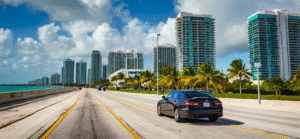Road Trips in Florida Are on the Rise — So Are the Legal Risks
Whether you’re planning a weekend getaway or just love the freedom of the open road, road trips have become one of the most flexible and affordable ways to travel. With the rising cost of flights and hotels, more Floridians are packing up their cars and hitting the open road. But personal injury attorney Merick Lewin, founder of Good Guys Law, is sounding the alarm: your dream getaway could turn into a legal nightmare if you’re not prepared.
More Cars, More Crashes — Especially in Florida
A recent report from Enterprise Mobility shows that 66% of Americans plan to take an overnight trip 50+ miles from home this summer — and 60% will rely on personal or rental vehicles to get there. That means more traffic on Florida’s highways, more accidents, and more complicated legal situations when things go wrong.
From Miami to Jacksonville, road trip-related crashes in Florida often involve:
- Out-of-state drivers unfamiliar with local laws
- Rental cars with confusing insurance coverage
- Rideshare vehicles like Uber or Lyft
- Fatigued drivers pushing through long hours
- Multi-car pileups on busy interstates
What Happens If You’re in a Crash Far From Home?
Most people don’t think about legal consequences when planning a trip — but a single accident can lead to serious financial and legal headaches, especially if it happens outside your home county or involves a rental vehicle. According to Merick Lewin, these are the three biggest legal risks road trippers face:
1. Not Knowing What Coverage You Actually Have
Before you hit the road, review your insurance policy — especially if you’re crossing state lines. Florida’s no-fault system and PIP (Personal Injury Protection) coverage works differently than in other states, and it might not be enough to cover serious injuries.
2. Rental Cars and Rideshare Confusion
If you’re in an accident while using a rental vehicle or riding in an Uber/Lyft, the liability isn’t always clear. Depending on the policies in place, you could be caught between multiple insurance providers — and left without full coverage.
3. Saying the Wrong Thing After an Accident
In the confusion following a crash, it’s easy to say something that can later be used against you. Avoid admitting fault, even if it is unintentional, and stick to the facts. Always call 911, gather photos and witness info, and seek medical attention — even if you feel fine.

The Road Trip Legal Checklist: Florida Edition
Before you head out on your Florida road trip, here are a few tips to protect yourself:
- Review your insurance coverage — especially PIP limits and rental car protections
- Get a vehicle checkup — worn tires or brake issues could raise liability if something goes wrong
- Plan rest breaks — drowsy driving is a major cause of accidents and is considered negligent behavior
- Know what to document — photos of the scene, your injuries, and insurance info are key
- Have a legal contact saved — If things go south, it helps to know who to call. Save 800-800-LAWS in your phone now.
Bottom Line: Don’t Let a Crash Derail Your Trip
A little legal prep can go a long way in making sure your road trip stays safe, fun, and stress-free. But if the unexpected happens, Good Guys Law is here to help — from rental car accidents to multi-state claims, we fight for people, not payouts.
Need help after a crash on the road?
Call us at 800-800-LAWS or visit goodguyslaw.com





